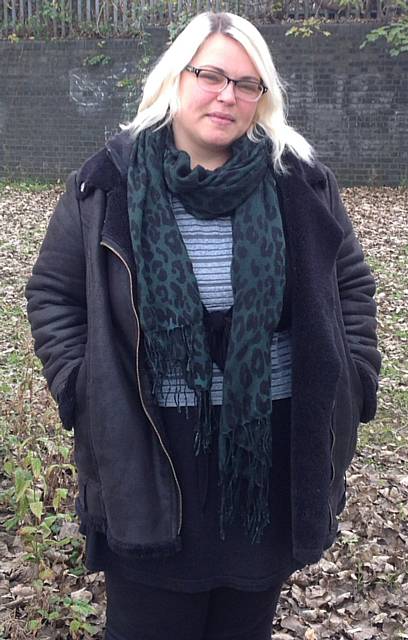Marie Penney, runaway turned social worker, helps mark ‘Safe in the City’ birthday
Date published: 26 November 2015

Marie Penney from Middleton, a child-runaway turned social worker
Marie Penney, from Middleton, a child-runaway turned social worker is returning to the Greater Manchester charity service that helped her as it celebrates its 25th birthday.
Marie Penney, now 32, will tell of her experiences as The Children’s Society’s Safe in the City programme marks the anniversary of the service, which helps children and young people who go missing from home.
Project workers and managers past and present will be joined by representatives from social work, the police, the Church of England and young people who currently receive support at the special event. It takes place at The Z-arts Centre in Hulme from 3-7pm on Thursday, 26 November.
Guests will reflect on the successes of the service so far and look ahead to what more can be done to protect vulnerable children and young people.
There will be a ‘soapbox’ for people to share their stories and experiences, as well as birthday balloons, cake and a giant card. Young people from Unity Radio’s NGY show, which highlights issues around child sexual exploitation, will broadcast their drive-time show from the event.
There will also be displays showing the work of other local services run by The Children’s Society, including support for children and young people in care, those at risk of domestic and sexual abuse and young refugees.
Marie, who lives in Manchester, is among thousands of young people who have received support from Safe in the City since its launch in 1990, including 384 since January 2014.
Staff offer return home interviews to all young people who have returned after being reported as missing from home in Manchester, Salford and Rochdale, with the aim of identifying why they have run away and preventing it from happening again. There is also more sustained one-to-one support for those who need it.
Marie ran away several times at the age of 15 in 1998 due to issues at her then family home in Middleton.
But after receiving vital support from The Children’s Society she is now helping other young people in similar situations after becoming a social worker.
Marie said she faced huge risks during the time she spent sleeping rough and on friends’ sofas in Manchester before she called The Children’s Society’s Safe in the City service after seeing one of the charity’s leaflets.
“When I was missing I was too young to get scared but if someone had attacked me there would have been nothing I could have done,” she said.
“A friend’s older sister tried to get me involved in prostitution. I was annoyed more than anything but looking at it now I was in a lot of dodgy situations.”
Staff from The Children’s Society met Marie at Burger King in Manchester and brought her a survival pack including food and essential items like a toothbrush.
Marie continued to receive support from The Children’s Society after being placed in a children’s home in Rochdale in January 1999, where new threats included child sexual exploitation – something she later reported to police.
“A girl at the children’s home took me to a flat in Rochdale above a kebab shop and there was a group of men trying to give me gifts,” she added. “I thought ‘what is this place’? but some girls did crave what they saw as love and affection.
“I think support from organisations like The Children’s Society is really important because young people see them more as ordinary people and they are sometimes more likely to open up to them. They were good at asking what I wanted.”
In 2012, The Children’s Society’s Make Runaways Safe campaign culminated in a Runaways Charter which set out guidelines for local councils, police and Local Safeguarding Children Boards around how the issue should be tackled and what support children and young people should expect.
Rob Jackson, Greater Manchester Area Director at The Children’s Society, said: “We are extremely proud of the role we have played in Greater Manchester over the last 25 years in supporting young runaways and raising awareness of the dangers they face.
“When children and young people go missing they can be at risk of many things, including child sexual exploitation, being exposed to alcohol and drugs and becoming involved in crime.
“We work closely with other organisations like the police and social services but more investment is needed to help prevent children and young people from going missing and to enable us to provide more intense support where necessary, including with families.
“Marie’s story shows that it’s still possible for children and young people to get their lives back on track and that this kind of help gives them a better chance.”
Greater Manchester Police figures show the number of reports of under-18s going missing rose from 11,939 in 2013 to 12,555 in 2014.
Nationally, around 100,000 children go missing every year – that’s one every five minutes.
Do you have a story for us?
Let us know by emailing news@rochdaleonline.co.uk
All contact will be treated in confidence.
Most Viewed News Stories
- 1Royton haulage firm fined after Rochdale dad went to work and didn’t come home
- 2Rochdale church to host Camerados public living room
- 3Unique colour and sound experience comes to Rochdale in May
- 4Suspended council candidate was ‘politically naive’ for appearing in George Galloway video, leader...
- 530 years of the GEM Appeal, a Rochdale-founded charity that has raised millions and changed the...
To contact the Rochdale Online news desk, email news@rochdaleonline.co.uk or visit our news submission page.
To get the latest news on your desktop or mobile, follow Rochdale Online on Twitter and Facebook.


